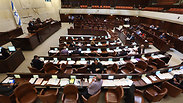
Israel passes law sanctioning force-feeding prisoners; doctors vow court fight
Shortly after Knesset approves law allowing force-feeding of hunger strikers, the Israeli Medical Association declares it will challenge it in Supreme Court; Interior Minister Erdan says law is a necessity.
Israel's parliament passed a contentious law on Thursday that would permit the force-feeding of inmates on hunger strike, eliciting harsh criticism over the practice.
The law allows a judge to sanction the force-feeding or administration of medical treatment if there is a threat to the inmate's life, even if the prisoner refuses. It passed with a 46-40 vote in favor – a slender margin in the 120-seat Knesset. The remaining lawmakers were absent from the early morning vote.
While the law applies to all prisoners held in Israeli jails, Palestinian prisoners have used hunger strikes as a tool to draw attention to their detention without trial or charges. Scores of Palestinian inmates have held rounds of hunger strikes over recent years and, with many prisoners hospitalized, their failing health has caused tensions to flare among Palestinians.
Fearing that a hunger striking prisoner's death could trigger unrest, Israel in the past has acceded to hunger-striking prisoners' demands and at times has released prisoners.
"The law creates the right balance between the state's interest to protect the prisoner's life and his rights and sovereignty over his body," said David Amsalem, a lawmaker with the ruling Likud party who backed the law. He added that the decision whether to force-feed would be made by the state prosecutor, after hearing the inmate's position and a doctor's ruling.
Critics say force-feeding is unethical and amounts to torture. The Israeli Medical Association, which has urged physicians not to cooperate, plans to challenge the law in the Supreme Court.
"Israeli doctors ... will continue to act according to medical ethical norms that completely prohibit doctors from participating in torture and force-feeding amounts to torture," said Leonid Eidelman, the head of the association.
Another group, Physicians for Human Rights-Israel, said the law is political, meant to prevent violence sparked by hunger striking prisoners rather than protect the prisoner's dignity and well-being.
Qadura Fares, chairman of the Palestinian Prisoners Society, called the law "ugly" and said it violated the prisoners' right to conduct a hunger strike.
Interior Minister Gilad Erdan said the law was a necessity. "Terrorism is wearing a new face in the last few years," he said.
"Alongside attempts to boycott and delegitimize Israel, hunger strikes by imprisoned terrorists have become a tool used to pressure and threaten Israel and make it release prisoners," he added. "The new law allows us to prevent a risk to prisoners' lives and prevent them from applying pressure on the state."
According to Erdan, "the bill was formulated in the context of lengthy hunger strikes by prisoners and security detainees in 2012, which involved complex challenges both medically and in terms of security. The new law will create the required balance between Israel's right to protect its citizens from the phenomenon of hunger-striking prisoners, and its duty to act humanely towards anyone under its protection and to defend the human rights of every human being."











